St. Michael Medical Center requests staffing support as COVID-19 wears on employees
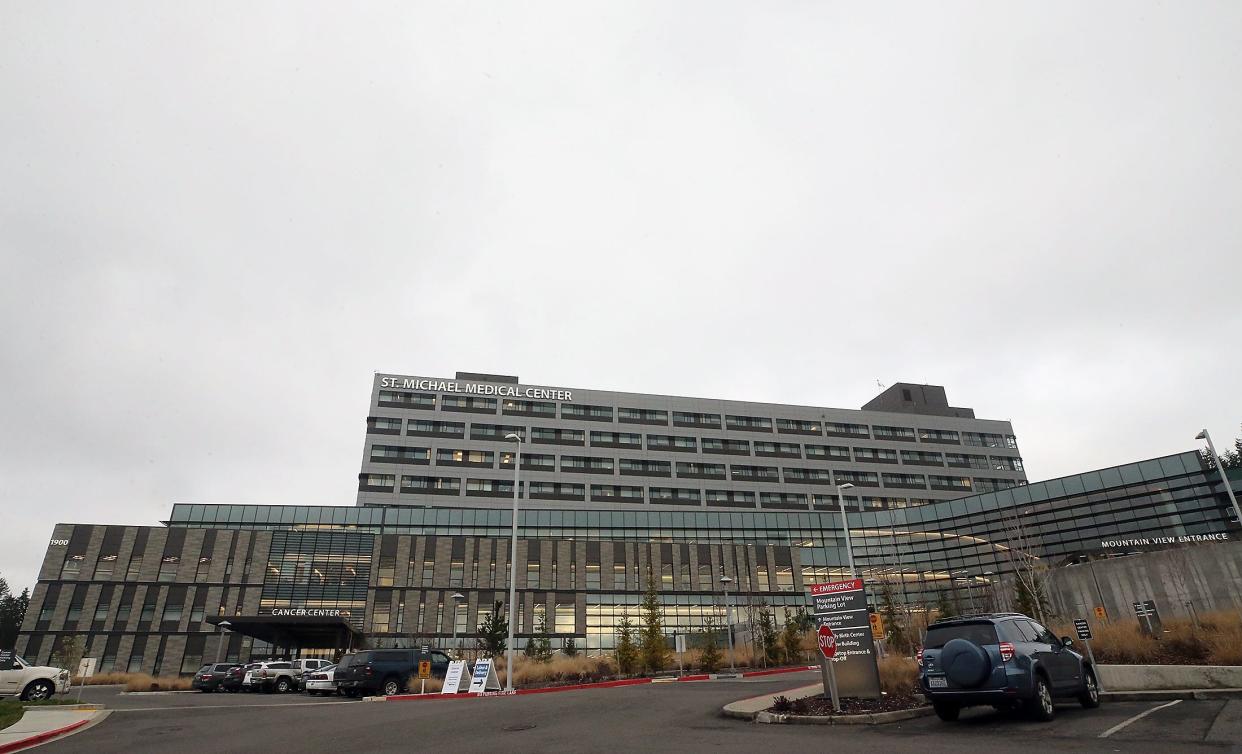
SILVERDALE – St. Michael Medical Center has been relying on government-funded travel nurses to weather a critical staffing shortage and repeated surges of COVID-19 patients arriving at Kitsap County's main hospital.
Stretched thin even before the pandemic, an exhausted roster of nurses and hospital staff continue to care for an ever-booming caseload. St. Michael's 55-bed emergency department saw 249 people on a single day, Jan. 3, a record far exceeding its average of 185. As the rapidly spreading omicron COVID-19 variant has sent cases spiking, the first week of January saw a pandemic-high 61 COVID-19 hospitalizations in Kitsap.
“If we didn’t have these (travel nurses), I don’t know how we would stay open or how we would take all this influx of patients,” said Cindy Franck, a staff nurse at the hospital and a union representative for UFCW 21.
The travel nurses – contracted staff brought in through an outside agency – were requested by the hospital last year, even before the arrival of omicron, which has further strained hospital systems around the world.
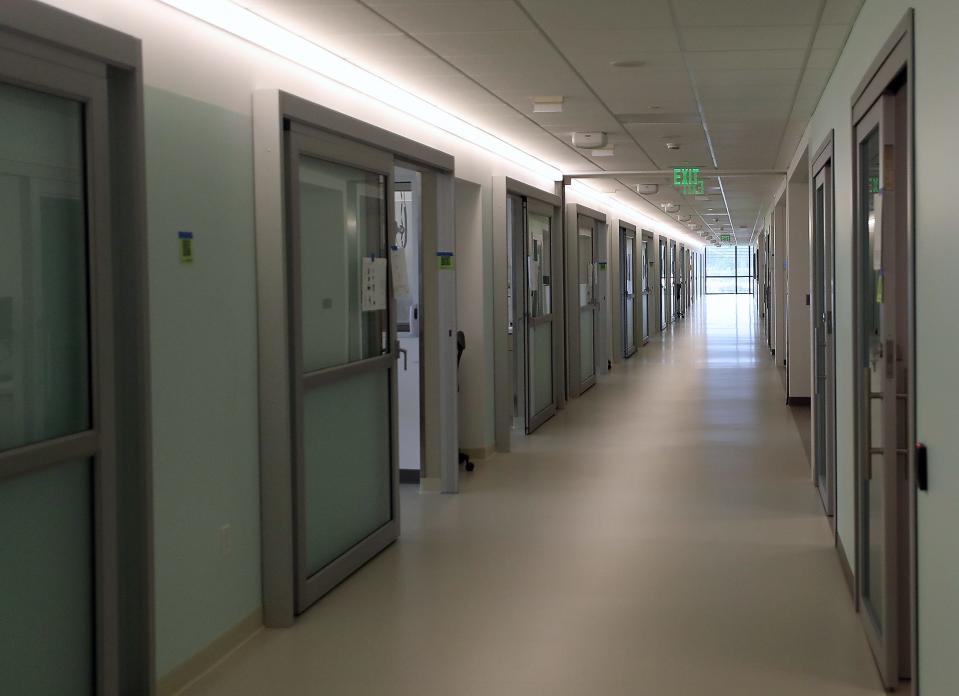
More: St. Michael emergency room plagued by staffing shortage, hospital workers say
St. Michael Medical Center president Chad Melton confirmed to the Kitsap Sun that the hospital requested nursing help through the Kitsap County Department of Emergency Management. Through a state contract with ACI Federal, the hospital was granted two nurses in September and 50 in October; eight nurses were requested in November, but that request was pending, Melton said.
State Secretary of Health Umair Shah said Thursday that 875 of 1,210 health care staffers available through the state's contract have already been deployed to hospitals and long-term care facilities throughout that state. Another 200 people were in the process of being deployed, leaving 135 employees still available under the contract. Staff used for direct COVID-19 patient care are paid for by pandemic response funds.
Gov. Jay Inslee urged hospitals to take advantage of the available staff: "We need to get these people treated, and we need more staff," he said. "They need to step up to the plate and hire these people."
'Nurses are burned out'
St. Michael Medical Center nurses who spoke to the Kitsap Sun for this story described nursing shortages in the hospital, but also staffing issues in jobs like certified nursing assistants and environmental services staff. Their experiences mirror difficulties faced across the country at hospitals, which lost an average of 3,000 employees per month last year, according to federal data.
“Nurses are burned out," Franck said. "Our staff, before we got all of these travelers, have been working 5, 6, 7 days a week, taking multiple shifts every week. The money is good, but the burnout is high.”
Franck said the staffing shortage predates the COVID-19 pandemic. “It was kind of like an accident waiting to happen,” she said.
Melton said the staffing requests for the traveling nurses were a “direct result of the increase of COVID cases, paired with a general increase in hospital visits in some cases driven by patients seeking treatment that were delayed during the pandemic.”
Melton said the hospital is taking several steps to address staffing levels, including incentive pay and hiring travel nurses, as well as recruiting staff from across the country. He said it's typically more difficult to recruit on the peninsula.
"We have also experienced retirements and resignations from staff members resulting from burnout throughout the pandemic," he said.
More: 'Swamped' emergency room at St. Michael suffers from staffing issues, COVID-19 onslaught
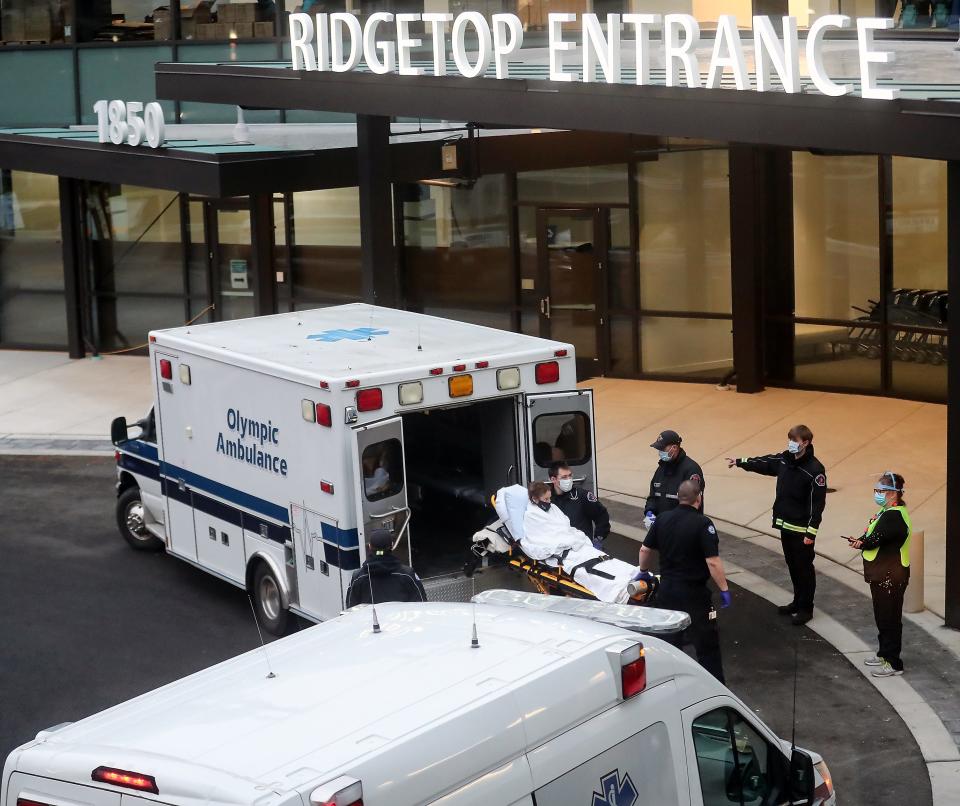
The most acute staffing issues at the hospital have come in the emergency room, the family birth center and in critical care areas, one nurse who works at the hospital told the Kitsap Sun, which granted the employee anonymity because they feared retaliation for speaking publicly.
“We get calls every single day about being short-staffed,” the nurse said. “Can you come in today? Can you come in the next day? I don’t know if that’s sustainable in the long run. You need to get more people, and the people need to want to be there.”
It can be frustrating for staff to know that travel positions offer much better pay, so some will leave for one of those jobs, the nurse said. As the pandemic has worn on, some have left the industry for good or have retired early.
Another nurse said that prior to the influx of travel nurses, staffing was “pretty critical.” That nurse, who worked in the hospital's emergency department, did not wish to be identified for fear of jeopardizing their career prospects.
“They’re short-staffed, so nurses are required to clean rooms, take out the trash, take out laundry, even sweeping and mopping floors in between patients,” the second anonymous nurse said. “When you’re turning rooms over every 30 minutes to 3 hours, that’s a lot of cleaning that nursing staff is being required to do. That has definitely been a challenge. It’s embarrassing because the rooms don’t look so great and patients come in and have to see a dirty floor.”
Virginia Mason Franciscan Health has done little to provide incentives to retain permanent staff, said that nurse, who planned to leave a staff job for a travel position, pointing to the better pay that such a job would offer.
A short-term fix
A jobs report released by the Bureau of Labor Statistics earlier this month showed hospital employment was down by about 96,000 compared with February 2020 and that hospitals lost an average of 3,000 jobs per month in 2021. Overall, health care jobs have been pummeled by the pandemic: The country is about 400,000 jobs below where it was when it lost 1.6 million positions in March and April 2020.
There’s been a reliance on travel staff across the health care industry to cover hard-to-fill staffing gaps during the pandemic, said Sue Skillman, senior deputy director of the University of Washington Center for Health Workforce Studies, describing those positions as a “short-term fix.”
“Certainly, there’s a tendency right now to use (travel staff) among the tools for fixing the problem and keeping the lights on and the doors open,” she said.
While using travel staff can help to fill holes, there are downsides.
“A lot of hospitals especially are using traveling agencies, but there’s mixed feelings,” said Ben Stubbs, who also works in UW Center for Health Workforce Studies. “There’s this push-pull where they’re seeing their own employees leave for the – in many cases – much higher wages that they can earn, and then feeling that they have to then go to those same travel agencies that in many cases, they feel have sort of poached their employees to fill those same roles.”
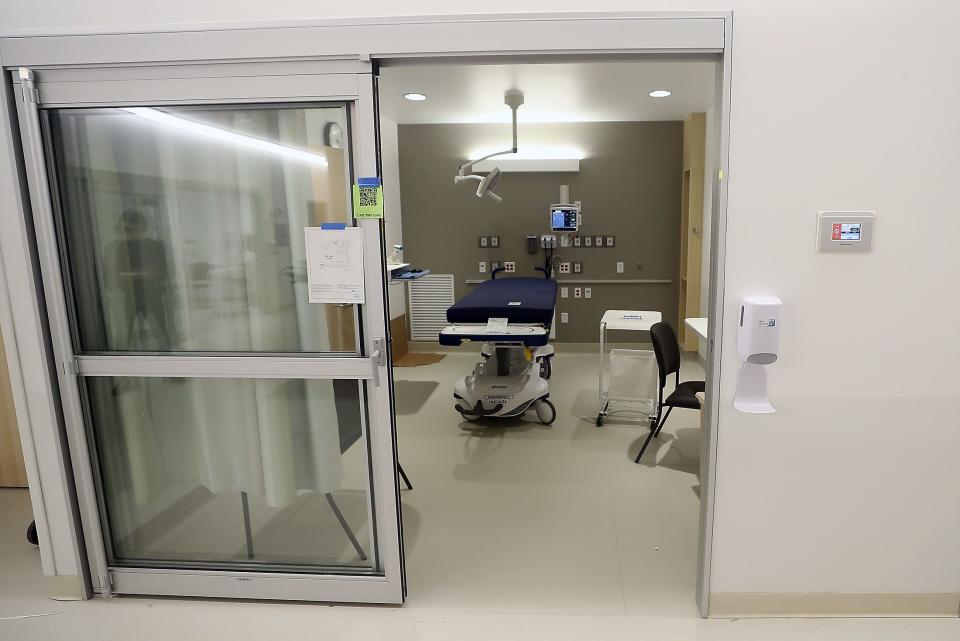
Nursing shortages aren’t all that’s plagued the industry though. There’s been “incredible” problems filling positions at the lower end of the pay scale, jobs like nursing assistants and home care workers, Skillman said, at a time when a job outside the industry might be more attractive.
“Where else are there jobs right now?” she said. “All retail is begging for people, all service industry is begging for people. So let's see, I'm taking care of elderly people with COVID infections in a nursing home or I can go work at a Fred Meyer or a Walmart or a hotel or something and not be around people for the same amount of money or more, because those wages are going up too.”
Skillman described a range of issues that have contributed to the staffing problems the industry now faces. Some who were thinking of retiring decided now was the time to step away. Others have decided to stay home to take care of their families. Some fear exposure to COVID-19 and don’t want to take the risk, and others are simply getting sick.
Omicron is another log added to the fire.
“There’s a lot of things going on,” Skillman said. “It’s just come together into an across-the-board reduction of available workforce and health care is potentially even more so, because of the risks and then the burnout of dealing with all the COVID issues.”
'A constant juggle'
In an interview with the Kitsap Sun, Melton, president of St. Michael Medical Center since September, said he’s impressed with how hospital staff have handled a crushing load. The hospital, since its Dec. 20, 2020, opening, has served more than 138,000 patients.
"This team has worked extremely hard," he said.
Delays at the emergency room, where even fire department ambulances have stacked up for hours in the past year, is a symptom of the wider problem, Melton said. Too many people are "boarded" there, because they can't access the care they need after arriving at the emergency department. That backs up the entire system.
"It's a constant juggle all day," he said.
The hospital's 55-bed emergency room has been expanded to include space in the facility's former ER. The hospital can also "surge" its capacity using its catheterization laboratory or pre-op surgery departments.
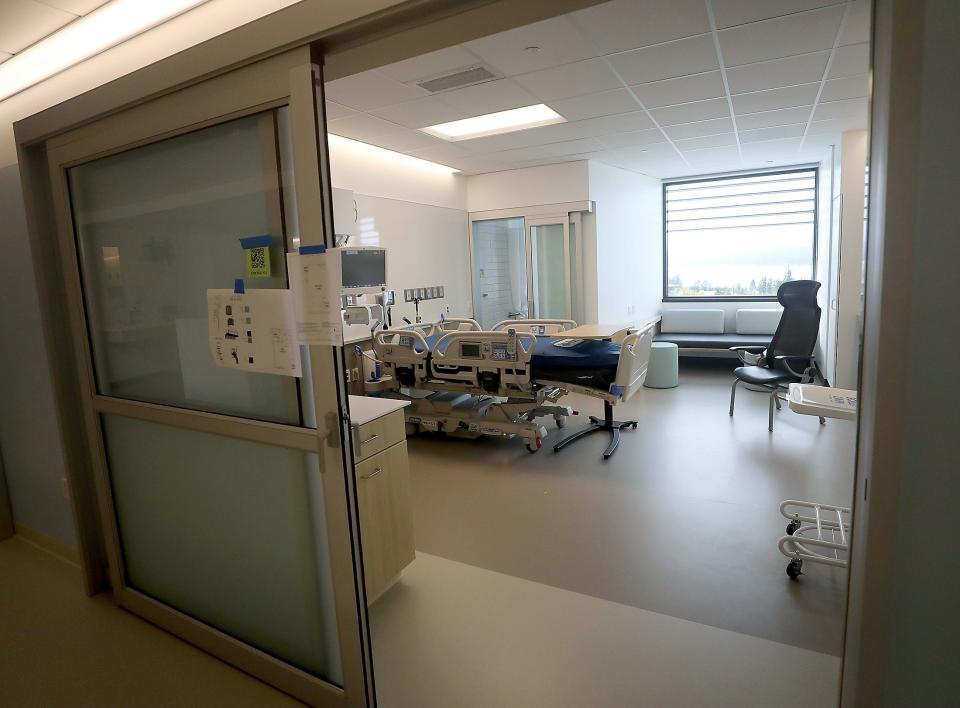
Another struggle Melton pointed to is the limited number of post-acute care beds the state currently has, which he said means hospitals are not always able to discharge patients to places like skilled nursing facilities as quickly as they usually might.
There's only one long-term way out: hire and retain a workforce. It's one of Melton's top three goals, along with maintaining accreditation and positive hospital evaluations and increasing community outreach.
In his previous job, Melton helped start a year-long nurse residency program. He believes in a grassroots approach that trains the doctors and nurses in the communities where they ultimately work and pointed to the local family residency program that minted seven new doctors, six of whom have remained in the area practicing. Melton also noted that a new class of 31 nurse residents, many of them graduates of Olympic College, are soon graduating to help fill the depleted ranks of the hospital. "One of my fundamental beliefs is it starts with our people," he said.
To further help, Melton urged the community to get vaccinated against COVID-19 and seek a booster shot. He also cautioned community members against driving to the emergency room if their needs are not emergent.
"Despite these challenges, we are well-prepared to manage these dynamics and urge the community not to delay care," Melton said. "We are carefully monitoring these factors across the hospital system to ensure we provide our patients with the care they need."
Consider supporting local journalism in Kitsap County: Sign up for a digital subscription today.
This article originally appeared on Kitsap Sun: St. Michael Medical Center requests staff as COVID-19 wears on

